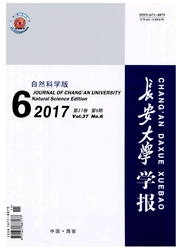

 中文摘要:
中文摘要:
The accurate prediction of travel time along roadway provides valuable traffic information for travelers and traffic managers. Aiming at short-term travel time forecasting on urban arterials,a prediction model( PSOSVM) combining support vector machine( SVM) and particle swarm optimization( PSO) is developed. Travel time data collected with Bluetooth devices are used to calibrate the proposed model. Field experiments show that the PSO-SVM model ’s error indicators are lower than the single SVM model and the BP neural network( BPNN) model. Particularly,the mean-absolute percentage error( MAPE) of PSO-SVM is only 9. 453 4 %which is less than that of the single SVM model( 12. 230 2 %) and the BPNN model( 15. 314 7 %). The results indicate that the proposed PSO-SVM model is feasible and more effective than other models for shortterm travel time prediction on urban arterials.
 英文摘要:
英文摘要:
The accurate prediction of travel time along roadway provides valuable traffic information for travelers and traffic managers. Aiming at short-term travel time forecasting on urban arterials, a prediction model ( PSO- SVM) combining support vector machine (SVM) and particle swarm optimization (PSO) is developed. Travel time data collected with Bluetooth devices are used to calibrate the proposed model. Field experiments show that the PSO-SVM model' s error indicators are lower than the single SVM model and the BP neural network (BPNN) model. Particularly, the mean-absolute percentage error ( MAPE ) of PSO-SVM is only 9. 453 4 % which is less than that of the single SVM model ( 12. 230 2 %) and the BPNN model ( 15. 314 7 %). The results indicate that the proposed PSO-SVM model is feasible and more effective than other models for short- term travel time prediction on urban arterials.
 同期刊论文项目
同期刊论文项目
 同项目期刊论文
同项目期刊论文
 期刊信息
期刊信息
